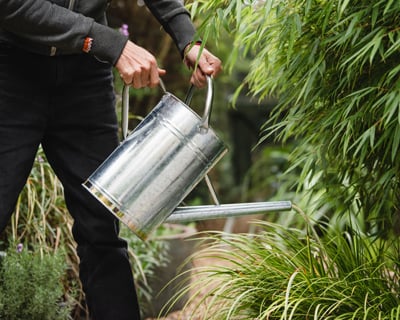Recycling bathwater for watering gardens set to become mainstream
Greywater is expected to become a go-to source of water for the garden by 2035, predicts RHS Senior Water Scientist
As climate change leads to hotter, drier summers in which rainwater stores are more quickly used up, gardeners are expected to increasingly look for ways to keep their plants hydrated through the summer months while reducing their reliance on mains water.
Many of us already turn to using some form of greywater for watering during the summer months, such as using washing up water, but recycling of household water from taps, showers and baths is expected to become mainstream practice over the next decade, according to RHS Senior Water Scientist Dr Nicholas Cryer.
A key role for greywater
RHS Science, having grown its water research capabilities following the appointment of Dr Cryer and Water Reduction Officer Janet Manning, will explore how greywater use can be expanded to play a significant role in maintaining both its own five gardens and the estimated 23 million domestic gardens across the UK. This will be achieved by looking at how water can be practically recycled from sinks, baths and washing, and conducting research into which plants and substrates are most effective in water cleaning.
This includes researching plant and substrate combinations that support the right soil microbiology and plant functions to remove potential pollutants, and developing practical solutions for the movement of water from house to garden.
Rain gardens help to manage unpredictable rainfall
Rain gardens are being created across the five RHS Gardens as a way to hold water for longer in the landscape, manage rainwater run-off to minimise flood risk, and act as sponges for water that is then stored ready for uptake during dry spells. Rain gardens such as the Dry Garden at RHS Garden Hyde Hall require no watering once established.
Fundamental to all rain gardens is healthy, deeply
Gardens showcasing clever rainwater management feature heavily at the RHS Chelsea Flower Show this year, including in The WaterAid Garden, which includes a rainwater harvesting pavilion designed to slow down the flow of water, collecting and storing it for irrigation of the garden and filtering it for use as drinking water. In The National Autistic Society Garden, rainwater is channelled away from the main terrace via a ‘waterfall roof’. This feeds into a mossy dell that acts as a swale during periods of high rainfall, holding water until it can drain away into the subsoil. Rain is also channelled into areas planted with species that can cope with wet conditions.
Managing water in your own garden
RHS Senior Water Scientist Dr Nicholas Cryer says: “The greenest approach to watering your garden is to minimise its use entirely through clever planting and good soil care, with rainwater harvesting the next best thing. But with summers predicted to become hotter and drier and the need to remedy a growing water deficit we need to be more creative in how we maintain our green spaces.
“Single use products are now rightly frowned upon and we should consider water the same way. The estimated 60 litres of greywater produced per person within our homes each day can be recycled in our gardens.”


